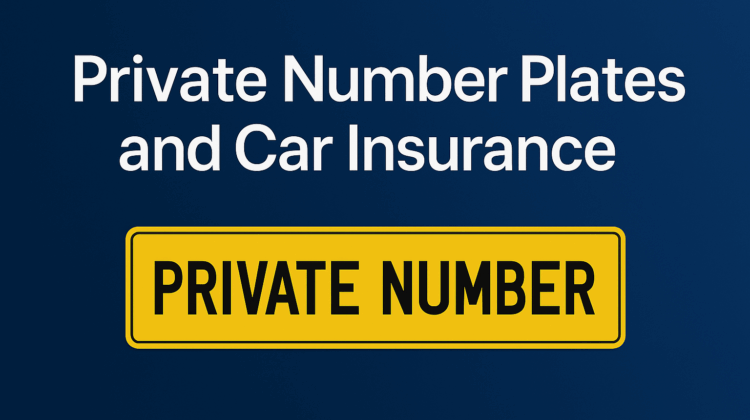
Private number plates are a popular way to personalise your vehicle, add a touch of individuality, and even make a statement on the road. But while they’re undeniably stylish, many drivers wonder: do private plates affect car insurance? The answer isn’t as straightforward as a simple yes or no. In this article, we’ll explore how private plates interact with insurance policies, what you need to declare, and how to protect your investment—especially if you’ve purchased through a trusted supplier like Regplates.com.
What Are Private Plates?
Private plates, also known as personalised or cherished number plates, are custom registration marks that replace the standard DVLA-issued format. They can reflect names, initials, hobbies, or even business branding. At Regplates.com, you’ll find over 45 million private plates for sale, ranging from affordable options to rare, high-value registrations.
Whether you’re buying a plate for aesthetic appeal or as a long-term investment, it’s important to understand how this change might affect your vehicle’s insurance.
Do Private Plates Increase Insurance Premiums?
In almost all cases, private plates do not increase your insurance premium. That’s because insurers typically assess risk based on factors like:
- Vehicle make and model
- Driver history
- Location
- Usage (e.g. commuting vs. leisure)
A private plate doesn’t alter the car’s performance, safety, or value in a way that would affect risk. It’s considered a cosmetic change, not a mechanical modification.
However, there are some companies that may charge a small admin fee to update your policy with the new registration number.
What You MUST Declare to Your Insurer
Even if your premium doesn’t change, you are legally required to inform your insurer when you assign a private plate to your vehicle. Failing to do so could:
- Invalidate your policy
- Complicate claims
- Delay payouts in the event of theft or damage
When notifying your insurer, provide:
- The new registration number
- The date of assignment
- Any documentation from the DVLA (e.g. V750 Certificate of Entitlement)
This ensures your vehicle is correctly identified in their system and avoids any confusion during claims processing.
Admin Fees and Policy Updates
While most insurers won’t raise your premium, many will charge a policy update fee—typically between £10 and £30. This covers the administrative cost of changing your registration details in their database.
If you feel the fee is excessive, you can challenge it or escalate the issue to the Financial Ombudsman Service. Regplates.com recommends checking with your insurer before assigning your plate to avoid surprises.
Insuring the Plate Itself
Here’s where things get interesting: your private plate may not be covered by default under your standard car insurance policy.
If your vehicle is stolen or written off, insurers often replace it with a standard DVLA plate and the cherished plate would be returned to you on a retention certificate for use on your next vehicle.
How to protect your personalised number plate:
- Ask your insurer if the plate is included in your policy
- Request written confirmation of coverage
- Always make sure your retention certificate is kept safe and is renewed when necessary.
If you’ve invested significantly in your plate—especially one purchased through Regplates.com—it’s worth ensuring it’s protected.
Transferring Plates Between Vehicles
One of the benefits of private plates is their transferability. You can move your plate from one vehicle to another, provided both are registered with the DVLA.
Regplates.com offers a professional transfer service that handles all the paperwork, making the process seamless. You’ll need:
- V5C logbook for both vehicles
- V750 or V778 certificate
- £80 DVLA transfer fee
For more details, visit Regplates’ Transfer Service page.
Legal Requirements and MOT Compliance
Private plates must comply with strict DVLA regulations. Failure to meet these standards can result in:
- Fines up to £1,000
- MOT failure
- Plate confiscation
Legal requirements include:
- Reflective material
- Black characters on white (front) and yellow (rear)
- No background patterns
- Correct spacing and font
Regplates.com ensures all plates meet DVLA standards, so you can drive with confidence and avoid penalties.
Common Myths Debunked
Let’s clear up a few misconceptions:
| Myth | Reality |
| Private plates always raise insurance | Not true—most insurers treat them as cosmetic |
| You don’t need to tell your insurer | False—failure to declare can invalidate your policy |
| All plates are covered by insurance | Only if explicitly stated in your policy |
| You can use any font or spacing | DVLA rules are strict—non-compliance leads to fines |
Why Choose Regplates.com?
With over 30 years of experience, Regplates.com is a DVLA Recognised Reseller and a trusted name in the private plate industry. Their services include:
- Expert guidance on plate selection
- Legal compliance assurance
- Seamless transfer and assignment
- Competitive pricing and customer support
Whether you’re buying your first plate or adding to a collection, Regplates.com makes the process easy and enjoyable. Explore their full range of plates on the Private Plates Search page.
Private plates are a fantastic way to personalise your vehicle, but they come with responsibilities. While they rarely affect your insurance premium, you must:
- Inform your insurer of the change
- Ensure the plate is legally compliant
- Consider insuring the plate itself
- Keep documentation up to date
By following these steps—and working with a reputable provider like Regplates.com—you can enjoy your private plate with peace of mind.

Jon Cherry is a Director of leading personalised number plate dealer Regplates.com. Jon has over 25 years industry experience handling some of the most expensive plates ever sold with many high profile and celebrity clients. Active since 1991 in the number plate industry, Jon is currently Chairman of the Cherished Numbers Guild, a trade body representing number plate dealers in the UK. Jon has written many articles on the industry and insight into the future of numberplates and the market as a whole.




